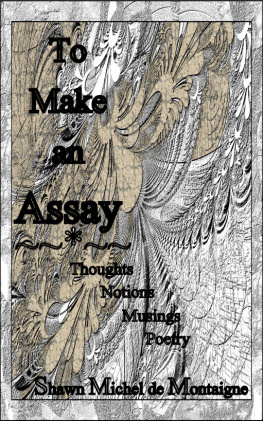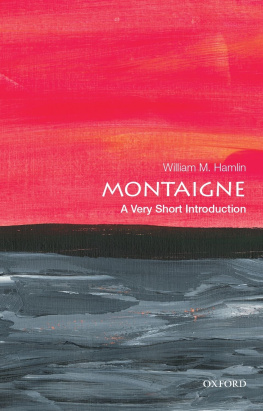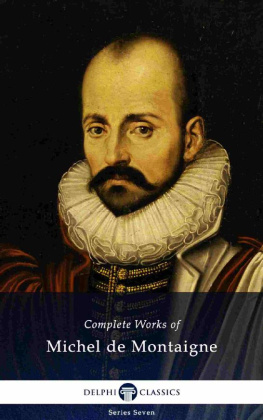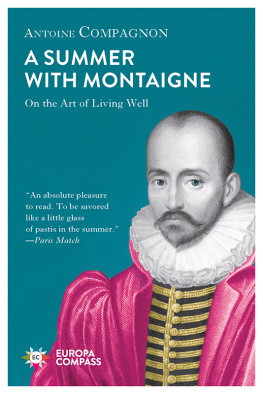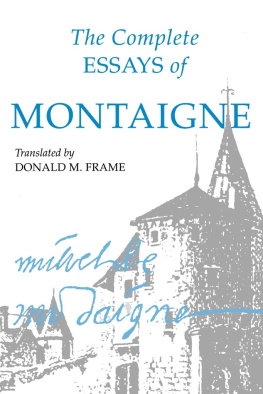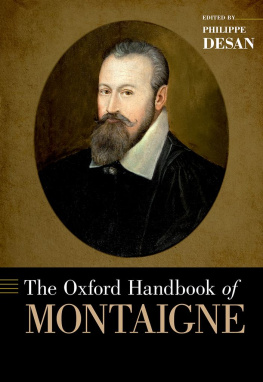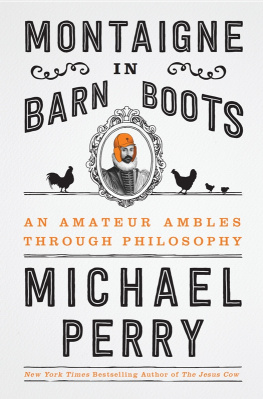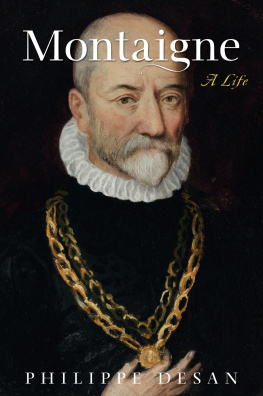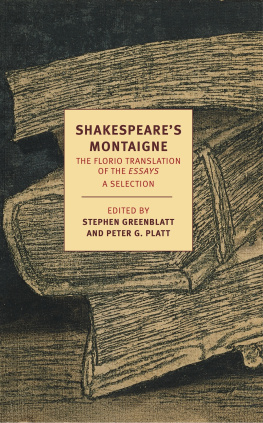Robertson - Montaigne and Shakespeare
Here you can read online Robertson - Montaigne and Shakespeare full text of the book (entire story) in english for free. Download pdf and epub, get meaning, cover and reviews about this ebook. genre: Science. Description of the work, (preface) as well as reviews are available. Best literature library LitArk.com created for fans of good reading and offers a wide selection of genres:
Romance novel
Science fiction
Adventure
Detective
Science
History
Home and family
Prose
Art
Politics
Computer
Non-fiction
Religion
Business
Children
Humor
Choose a favorite category and find really read worthwhile books. Enjoy immersion in the world of imagination, feel the emotions of the characters or learn something new for yourself, make an fascinating discovery.
Montaigne and Shakespeare: summary, description and annotation
We offer to read an annotation, description, summary or preface (depends on what the author of the book "Montaigne and Shakespeare" wrote himself). If you haven't found the necessary information about the book — write in the comments, we will try to find it.
Montaigne and Shakespeare — read online for free the complete book (whole text) full work
Below is the text of the book, divided by pages. System saving the place of the last page read, allows you to conveniently read the book "Montaigne and Shakespeare" online for free, without having to search again every time where you left off. Put a bookmark, and you can go to the page where you finished reading at any time.
Font size:
Interval:
Bookmark:
The Project Gutenberg EBook of Montaigne and Shakspere, by John M. Robertson
This eBook is for the use of anyone anywhere at no cost and with
almost no restrictions whatsoever. You may copy it, give it away or
re-use it under the terms of the Project Gutenberg License included
with this eBook or online at www.gutenberg.org
Title: Montaigne and Shakspere
Author: John M. Robertson
Release Date: May 20, 2008 [EBook #25535]
Language: English
*** START OF THIS PROJECT GUTENBERG EBOOK MONTAIGNE AND SHAKSPERE ***
Produced by Jonathan Ingram, Turgut Dincer and the Online
Distributed Proofreading Team at http://www.pgdp.net (This
file was produced from images generously made available
by The Internet Archive/Canadian Libraries)
| Transcribers note: Old spellings of the words have been retained as well as the doubtful use of colons instead of semicolons in many places for the sake of fidelity to the original text. |
THE UNIVERSITY PRESS, LIMITED
16, JOHN STREET, BEDFORD ROW, W.C.
1897
For a good many years past the anatomic study of Shakspere, of which a revival seems now on foot, has been somewhat out of fashion, as compared with its vogue in the palmy days of the New Shakspere Society in England, and the years of the battle between the iconoclasts and the worshippers in Germany. When Mr. Fleay and Mr. Spedding were hard at work on the metrical tests; when Mr. Spedding was subtly undoing the chronological psychology of Dr. Furnivall; when the latter student was on his part undoing in quite another style some of the judgments of Mr. Swinburne; and when Mr. Halliwell-Phillipps was with natural wrath calling on Mr. Browning, as President of the Society, to keep Dr. Furnivall in order, we (then) younger onlookers felt that literary history was verily being made. Our sensations, it seemed, might be as those of our elders had And, indeed, so much need was there for time to digest the new criticism that it may be doubted whether among the general cultured public the process is even now accomplished.
To this literary phase in particular, and to our occupation with other studies in general, may be attributed the opportunity which still exists for the discussion of one of the most interesting of all problems concerning Shakspere. Mr. Browning, Mr. Meredith, Ibsen, Tolstoia host of peculiarly modern problem-makers have been exorcising our not inexhaustible taste for the problematic, so that there was no very violent excitement over even the series of new "Keys" to the sonnets which came forth in the lull of the analysis of the plays; and yet, even with all the problems of modernity in view, it seems as if it must be rather by accident of oversight than for lack of interest in new developments of Shakspere-study that so little attention has been given among us to a question which, once raised, has a very peculiar literary and psychological attraction of its ownthe subject, namely, of the influence which the plays show their author to have undergone from the Essays of Montaigne.
As to the bare fact of the influence, there can be little question. That Shakspere in one scene in the Tempest versifies a passage from the prose of Florio's translation of Montaigne's chapter Of the Cannibals has been recognised by all the commentators since Capell (1767), who detected the transcript from a reading of the French only, not having compared the translation. The first thought of students was to connect the passage with Ben Johnson's allusion The suggestion as to the "To be or not to be" soliloquy has been taken up by some critics, but rejected by others; and the propositions of M. Chasles, so far as I am aware, have never been supported by evidence. Nevertheless, the general fact of a frequent reproduction or manipulation of Montaigne's ideas in some of Shakspere's later plays has, I think, since been established.
Twelve years ago I incidentally cited, in an essay on the composition of Hamlet , some dozen of the Essays of Montaigne from which Shakspere had apparently received suggestions, and instanced one or two cases in which actual peculiarities of phrase in Florio's translation of the Essays are adopted by him, in addition to a peculiar coincidence which has been pointed out by Mr. Jacob Feis in his work entitled Shakspere and Montaigne ; and since then the late Mr. Henry Morley, in his edition of the Florio translation, has pointed to a still more remarkable coincidence of phrase, in a passage of Hamlet which I had traced to Montaigne without noticing the decisive verbal agreement in question. Yet so far as I have seen, the matter has passed for little more than a literary curiosity, arousing no new ideas as to Shakspere's mental development. The notable suggestion of Chasles on that head has been ignored more completely than the theory of Mr. Feis, which in comparison is merely fantastic. Either, then, there is an unwillingness in England to conceive of Shakspere as owing much to foreign influences, or as a case of intelligible mental growth, or else the whole critical problem which Shakspere representsand he may be regarded as the greatest of critical problemscomes within the general disregard for serious criticism, noticeable among us of late years. And the work of Mr. Feis, unfortunately, is as a whole so extravagant that it could hardly fail to bring a special suspicion on every form of the theory of an intellectual tie between Shakspere and Montaigne. Not only does he undertake to show in dead earnest what Sterling had vaguely suggested as conceivable, that Shakspere meant Hamlet to represent Montaigne, but he strenuously argues that the poet framed the play in order to discredit Montaigne's opinionsa thesis which almost makes the Bacon theory specious by comparison. Naturally it has made no converts, even in Germany, where, as it happens, it had been anticipated.
In France, however, the neglect of the special problem of Montaigne's influence on Shakspere is less easily to be explained, seeing how much intelligent study has been given of late by French critics to both Shakspere and Montaigne. The influence is recognised; but here again it is only cursorily traced. The latest study of Montaigne is that of M. Paul Stapfer, a vigilant critic, whose services to Shakspere-study have been recognised in both countries. But all that M. Stapfer claims for the influence of the French essayist on the English dramatist is thus put:
"Montaigne is perhaps too purely French to have exercised much influence abroad. Nevertheless his influence on England is not to be disdained. Shakspere appreciated him (le gotait); he has inserted in the Tempest a passage of the chapter Des Cannibales ; and the strong expressions of the Essays on man, the inconstant, irresolute being, contrary to himself, marvellously vain, various and changeful, were perhaps not unconnected with (peut tre pas trangres ) the conception of Hamlet . The author of the scene of the grave-diggers must have felt the savour and retained the impression of this thought, humid and cold as the grave: 'The heart and the life of a great and triumphant emperor are but the repast of a little worm.' The translation of Plutarch, or rather of Amyot, by Thomas North, and that of Montaigne by Florio, had together a great and long vogue in the English society of the seventeenth century."
So modest a claim, coming from the French side, can hardly be blamed on the score of that very modesty. It is the fact, however, that, though M. Stapfer has in another work But that verdict was passed without due scrutiny. The influence of Montaigne on Shakspere was both wider and deeper than M. Stapfer has suggested; and it is perhaps more fitting, after all, that the proof should be undertaken by some of us who, speaking Shakspere's tongue, cannot well be suspected of seeking to belittle him when we trace the sources for his thought, whether in his life or in his culture. There is still, indeed, a tendency among the more primitively patriotic to look jealously at such inquiries, as tending to diminish the glory of the worshipped name; but for anyone who is capable of appreciating Shakspere's greatness, there can be no question of iconoclasm in the matter. Shakspere ignorantly adored is a mere dubious mystery; Shakspere followed up and comprehended, step by step, albeit never wholly revealed, becomes more remarkable, more profoundly interesting, as he becomes more intelligible. We are embarked, not on a quest for plagiarisms, but on a study of the growth of a wonderful mind. And in the idea that much of the growth is traceable to the fertilising contact of a foreign intelligence there can be nothing but interest and attraction for those who have mastered the primary sociological truth that such contacts of cultures are the very life of civilisation.
Font size:
Interval:
Bookmark:
Similar books «Montaigne and Shakespeare»
Look at similar books to Montaigne and Shakespeare. We have selected literature similar in name and meaning in the hope of providing readers with more options to find new, interesting, not yet read works.
Discussion, reviews of the book Montaigne and Shakespeare and just readers' own opinions. Leave your comments, write what you think about the work, its meaning or the main characters. Specify what exactly you liked and what you didn't like, and why you think so.








